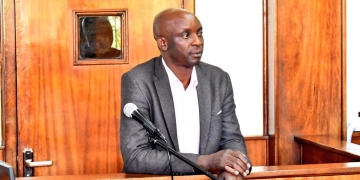Buvuma– The Judiciary, in collaboration with the United Nations Development Programme (UNDP), held a successful Court Open Day at Buvuma Magistrate’s Court grounds. The event which was held on Thursday, presided over by the Deputy Chief Justice, Hon. Justice Dr. Flavian Zeija, with an aim of engaging court users and gathering public feedback regarding access to Justice.

Justice Zeija during his speech, reaffirmed the Judiciary’s commitment to improving access to justice and judicial accountability across the country. He outlined several ongoing interventions including the decentralization of the Court of Appeal to regional levels, an increase in High Court circuits, recruitment of more judicial staff, expanded use of Information and Communication Technology (ICT), and plans to introduce mobile courts.
“These interventions are geared toward reducing the distance and costs people incur to access court services. We want to bring justice closer to where people live,” Justice Zeija said.
He also promised the residents of Buvuma that the Judiciary would fast-track the construction of court buildings now that funding has been secured.
“We are also working on securing boats for judicial officers as soon as possible so as to ease transportation on the island.”
He also noted the Judiciary’s intention to designate Magistrates Grade One at constituency level.
Zeija also encouraged judicial officers to maintain high standards of professionalism by managing time effectively, ensuring certainty of trial and hearing dates, delivering timely rulings, shunning corruption, and offering excellent customer care.
On the other hand, the Deputy Chief Justice , promised to to fast track the funding to begin construction on the land which was offered by the District leadership.
Acting Chief Registrar, Her Worship Lamunu Pamella Ocaya, commended the UNDP for supporting the Judiciary in organizing the first-ever Court Open Day on Buvuma Island. She emphasized the Judiciary’s dedication to service delivery and accountability, describing such engagements as vital for improving justice based on feedback from court users.

Representing the UNDP Country Representative, Ms. Annet Mpabulungi Wakabi, Governance and Peace Team Leader, commended the Judiciary for reaching out to underserved communities. She said that Buvuma’s remote location and limited access to formal justice mechanisms have led to reliance on informal systems. Court Open Days, she added, presented an opportunity for justice institutions to understand and respond to the unique justice needs of such communities, particularly for vulnerable groups such as women, youth, and the poor.
Ms. Mpabulungi noted that the initiative aligns with the Sustainable Development Goal principle of “leaving no one behind,” by making justice more accessible and understandable. She reiterated UNDP’s commitment to supporting justice sector reforms and promoting people-centered approaches to governance and justice.
Local leaders welcomed the Judiciary’s presence and praised the engagement as an important step in bridging the gap between the courts and the people they serve. They called for improved transport options for both judicial officers and court users, especially across water bodies, and urged the Judiciary to prioritize the construction of court infrastructure now that land has been allocated.
Lugazi Chief Magistrate, His Worship Mushebebe Moses Nabende, presented a number of challenges facing the Buvuma court. He cited the lack of judicial premises, inadequate furniture, poor infrastructure, and a severe shortage of staff—with only one support staff currently in place. He also noted the absence of accommodation and transport means for judicial personnel. He appealed to the Judiciary to prioritize the Buvuma court in its development plans to ensure the community can access meaningful justice.

Members of the public raised several concerns, including the infrequency of court sittings and the need for more regular hearings. They also expressed the need for life jackets for prisoners being ferried between locations, and requested more community engagement sessions.
One key issue raised was the lack of banking services on the island, which makes it difficult for court users to pay court fees and cash bail. Residents requested that banking services be made available at or near the court to facilitate these transactions. Concerns were also raised about the charging of fees for police bond and reports of mistreatment of civilians by army personnel at landing sites.
The Judiciary promised to address all grievances and complaints raised by the communities around Buvuma as one of the means of improving access to Justice on Island areas.
















